Social and Administrative Sciences
(226) Examining social determinants of health in patient cases – An insufficiency or missed opportunity?


Olihe N. Okoro, PhD, MPH (she/her/hers)
Associate Professor
University of Minnesota, College of Pharmacy
Duluth, Minnesota, United States
Primary Author(s)
Objective : Social determinants of health (SDOH) are conditions in the environments in which people are born, live, learn, work, play, worship, and age that affect a wide range of health, functioning, and quality-of-life outcomes and risks. The study objectives were to (i.) assess the extent of the integration of SDOH in patient cases used in the core PharmD curriculum in the 2019-2020 academic year, and (ii.) identify opportunities for further integration and discussion of SDOH in patient cases used in pharmacy education.
Methods: Patient cases used in years 1-3 of the PharmD program for the 2019/2020 academic year were reviewed. A content analysis of the cases was conducted to determine inclusion of SDOH, based on criteria outlined in the PRAPARE tool. Frequencies, proportions, and measures of central tendency were used to describe the data extracted.
Results: Forty-two percent (n = 227) of the 541 cases analyzed mentioned one or more SDOH. The proportion of patient cases with mention of one or more SDOH (78.8%, 37.8%, 31.9%), and the median number of SDOH mentioned per case (2, 1, 0), declined with increasing year of study, i.e. from Yr1 – Yr3, respectively. The most frequently mentioned SDOH were social integration (26.1%), race/ethnicity (17.2%), stress (14.2%), employment (9.4%), and housing (8.7%). Discussion questions for the patient cases focused primarily on medication therapy even when SDOH were included in the case.
Conclusions: Including SDOH into patient cases, if not considered in the contemplation of appropriate pharmacotherapy, is a missed learning opportunity. Pharmacy educators should adopt an integrative approach whereby SDOH are discussed alongside clinical parameters; equipping learners to provide holistic, patient-centered care and contribute to improving population health.
Methods: Patient cases used in years 1-3 of the PharmD program for the 2019/2020 academic year were reviewed. A content analysis of the cases was conducted to determine inclusion of SDOH, based on criteria outlined in the PRAPARE tool. Frequencies, proportions, and measures of central tendency were used to describe the data extracted.
Results: Forty-two percent (n = 227) of the 541 cases analyzed mentioned one or more SDOH. The proportion of patient cases with mention of one or more SDOH (78.8%, 37.8%, 31.9%), and the median number of SDOH mentioned per case (2, 1, 0), declined with increasing year of study, i.e. from Yr1 – Yr3, respectively. The most frequently mentioned SDOH were social integration (26.1%), race/ethnicity (17.2%), stress (14.2%), employment (9.4%), and housing (8.7%). Discussion questions for the patient cases focused primarily on medication therapy even when SDOH were included in the case.
Conclusions: Including SDOH into patient cases, if not considered in the contemplation of appropriate pharmacotherapy, is a missed learning opportunity. Pharmacy educators should adopt an integrative approach whereby SDOH are discussed alongside clinical parameters; equipping learners to provide holistic, patient-centered care and contribute to improving population health.

.png)